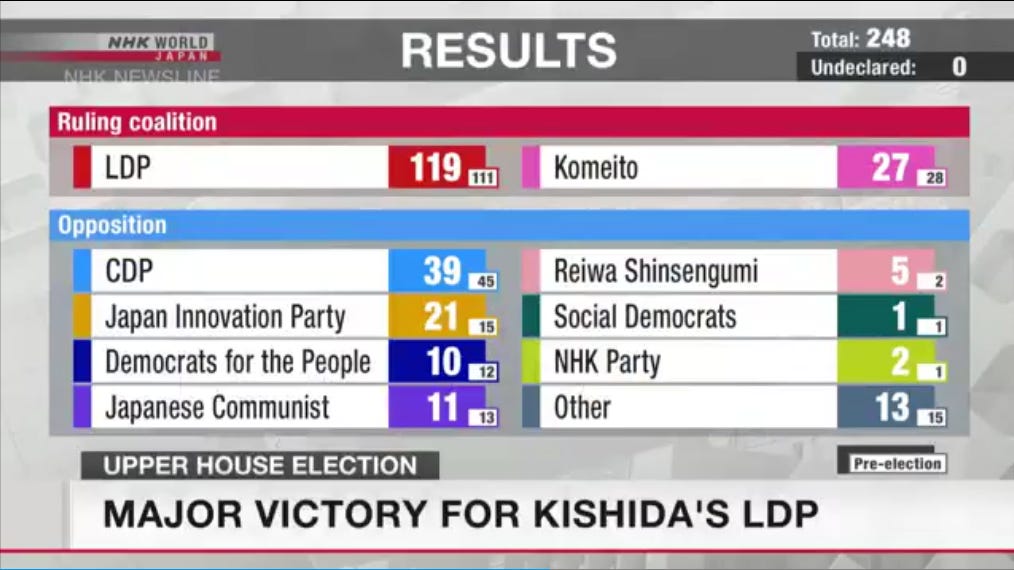Upper House Election Results: What happens next? (Updated 12 July)
PM Kishida’s Liberal Democratic Party (LDP) gained 8 seats in the Upper House (House of Councillors) election on 10 July, helping to increase the Upper House majority of the governing coalition (LDP + Komeito).
It also has a comfortable majority in the Lower House (House of Representatives).
So what’s going to happen next?
Covid
I assume the governing coalition will continue as now: mask mania, endless booster shots, pointless event restrictions.
The LDP manifesto contained a vague pledge about reviving international mobility while ensuring anti-Covid measures, and the Japanese travel industry and former PM Yoshihide Suga have called for the border controls to be relaxed to enable Japan to cash in on inbound tourism. Of course, this would require significantly raising or removing Japan’s daily limit of 20,000 international arrivals and giving foreign tourists the option of individual unescorted travel, not just North Korean style monitor tours.
But I doubt Kishida is going to try to persuade the Japanese public to live with the possibility of unmasked foreigners stalking the land while cases are high and rising. I suppose he could point out that Japan’s case rate is currently three times the world average so Japan is in no position to discriminate, but that would require a level of candor and honesty he’s never displayed before.
So if border controls are to be relaxed, it probably won’t be until after the current wave subsides.
Kishisda has said he’s not currently thinking of introducing new emergency or quasi-emergency restrictions, but I assume prefectural governors and city majors will again request that bars and restaurants close early again and that residents stay home as much as possible, causing domestic consumption to stagnate.
I also assume Kishida will maintain Covid’s special status as a Designated Infectious Disease for the foreseeable future rather than downgrade it to the same level as the flu. One of his previously stated reasons is to continue to enable governors to implement emergency and quasi-emergency restrictions. But an unstated reason may be to get Japanese pharma companies on the Covid vaccine gravy train more easily.
As I’ve written before, companies can now apply for emergency approval based on “presumed” effectiveness. So how effective is this new jab presumed to be? From here: “Based on data from the final phase of testing, it was found that test participants had a 99.9% probability of having higher levels of neutralizing antibodies than people who had received two doses of the AstraZeneca vaccine.” I’m surprised the FDA never thought of this regulatory innovation before.
KM Biologics plans to apply for emergency approval in September. Needless to say, emergency approval will be easier to obtain for a vaccine targeting a Designated Infectious Disease. If Covid is downgraded to Level 5 along with the flu, vaccine makers may actually have to (gasp) prove effectiveness prior to approval.
Constitutional Revision
The Wall Street Journal certainly takes the possibility of constitutional revision seriously.
The most prominent proposal is to revise the pacifist Article 9 to recognise Japan’s Self-Defense Forces in the constitution, but another is an emergency clause to give the government greater powers when states of emergency are declared, such as lockdown restrictions on people’s movements.
Any constitutional revision needs to be passed by two-thirds of both the upper and lower houses of the Diet and gain a simple majority in a referendum. The parties most interested in adding an emergency clause to the constitution (LDP, Ishin, DPFP) now hold just over two-thirds of the seats in the lower house (313 out of 465) but not in the upper house (150 out of 249). The LDP’s governing partner, Komeito, is on the fence.
There are also significant differences between the proposals. The LDP’s proposed emergency clause would allow the cabinet to rule by decree whenever the prime minister declares an emergency. Ishin and DPFP, on the other hand, propose establishing a constitutional court to ensure emergency powers aren’t abused. Komieto’s leader, Natsuo Yamaguchi, said last year he'd prefer individual laws to restrict rights during emergencies rather than a wide-ranging emergency clause.
The LDP doesn’t have enough seats in either house to push through its desired constitutional revisions by itself, so even if an emergency clause makes it through both houses, it’ll hopefully have to be watered down, e.g., by including a constitutional court. But any constitutional revisions that are eventually put forward in a referendum will doubtlessly offer more power to the politicians and fewer rights to the people: Covidiocracy in action!
Update 12 June
The results of a survey of 121 successful candidates in upper house election should help to clarify the positions of the four pro-revision parties’ MPs. 78% of LDP MPs, 92% of Ishin MPs, and 40% of DPFP MPs support adding an emergency clause that would lengthen MPs terms and strengthen cabinet powers (i.e., giving cabinet-issued emergency orders the power of law) during declared emergencies. But 38% of Komeito MPs don’t think an emergency clause is needed, and another 31% would support one that lengthens MPs terms but doesn’t strengthen cabinet powers. See what I mean about Komeito being on the fence? The article says that Komeito MPs are “wary that individual rights would be restricted by arbitrary invocations." I’m glad it’s not just me that feels that way! But last time I checked, Komeito hasn’t been that wary of any of arbitrary nonsense over the last 2.5 years.
Similarly, 87% of LPD MPs, 92% of Ishin MPs, and 40% of DPFP MPs support revising Article 9 to recognise the SDF, but 69% of Komeito MPs don’t.
So it looks like the ruling coalition’s junior partner might make constitutional revision hard for Kishida. And as far as I’m concerned, the harder the better.








